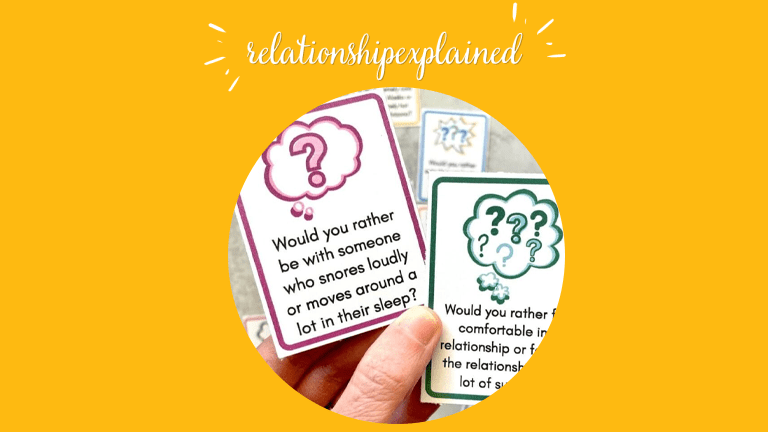Relationship Green Flags
Eager to cultivate a flourishing relationship that stands the test of time? Understanding the "green flags" in a relationship can guide you toward a partnership filled with mutual respect, deep connection, and enduring support. These positive indicators are the building blocks of a healthy relationship, where open communication, trust, and shared values pave the way […]
Eager to cultivate a flourishing relationship that stands the test of time?
Understanding the "green flags" in a relationship can guide you toward a partnership filled with mutual respect, deep connection, and enduring support. These positive indicators are the building blocks of a healthy relationship, where open communication, trust, and shared values pave the way for a harmonious journey together.
Well, we'll be going over:
- How can effective communication and trust serve as the cornerstone of a strong relationship?
- What role do respect and understanding of boundaries play in nurturing a healthy partnership?
- How can support, empathy, and healthy conflict resolution contribute to the growth and deepening of your connection?
Let's dive in.
Communication and Trust
One of the most important relationship green flags is effective communication and trust. Healthy relationships are built on a foundation of open and honest communication, where both partners feel comfortable expressing their thoughts and feelings. Trust is also essential for a healthy relationship, as it allows both partners to feel safe and secure with each other. When you and your partner communicate effectively and trust each other, you can work through any challenges that come your way and build a strong and lasting relationship.
Key Takeaways
- Relationship green flags are positive qualities and behaviors that indicate a healthy and strong relationship.
- Effective communication and trust are essential relationship green flags that promote a healthy and lasting relationship.
- Other important relationship green flags include respect and boundaries, support and partnership, empathy and kindness, and healthy conflict resolution.
Communication and Trust
Effective communication is essential to building trust in any relationship, especially romantic ones. When partners communicate effectively, they are more likely to feel heard, understood, and valued. Effective communication involves conveying your thoughts, feelings, and needs clearly and respectfully.
Active Listening
Active listening is a crucial component of effective communication. It involves paying attention to what your partner is saying, asking clarifying questions, and reflecting on what they have said. Active listening shows your partner that you value their thoughts and feelings, and it also helps to prevent misunderstandings.
Honesty and Clarity
Honesty and clarity are also essential components of effective communication. Being honest means being truthful about your thoughts, feelings, and actions. It involves being transparent and not withholding information from your partner. Clarity involves being clear and concise in your communication. It means avoiding vague language and being specific about what you mean.
In a healthy relationship, partners should feel comfortable expressing their thoughts and feelings without fear of judgment or retribution. Effective communication helps to build trust and intimacy, which are essential for a strong and healthy relationship.
Respect and Boundaries
When it comes to building a healthy relationship, one of the most important aspects is mutual respect and understanding of boundaries. In this section, we will discuss the importance of boundaries and how mutual respect plays a crucial role in maintaining a healthy relationship.
Understanding Boundaries
Boundaries are the limits that you set for yourself in a relationship. They can be physical, emotional, or mental. It is important to communicate your boundaries clearly to your partner and to respect their boundaries as well. This helps to build trust and understanding between the two of you.
Setting boundaries can be challenging, but it is necessary for a healthy relationship. It is essential to identify what your boundaries are and to communicate them with your partner. This can include things like personal space, time alone, or specific topics that you do not want to discuss.
Mutual Respect
Mutual respect is a cornerstone of a healthy relationship. It means that you value your partner's feelings, thoughts, and opinions, and they value yours. When you respect each other, you are more likely to communicate effectively, compromise, and work together to resolve conflicts.
Respect is not just about being polite or courteous. It is about acknowledging and accepting your partner's values, beliefs, and opinions, even if they differ from your own. This helps to build trust and understanding between the two of you.
In a healthy relationship, both partners should feel comfortable expressing their thoughts and feelings without fear of judgment or criticism. This requires mutual respect and an understanding of each other's boundaries.
In conclusion, understanding boundaries and mutual respect are essential for building a healthy relationship. By communicating your boundaries clearly and respecting your partner's boundaries, you can build trust and understanding between the two of you. When you respect each other, you are more likely to communicate effectively, compromise, and work together to resolve conflicts.
Support and Partnership
When it comes to green flags in relationships, support and partnership are key components. Emotional support is important for any healthy relationship. It means being there for your partner and helping them through difficult times. This can be anything from listening to them when they need to talk to offering advice or just being a shoulder to cry on. Emotional support can help you and your partner feel more connected and strengthen your bond.
Emotional Support
Emotional support can come in many forms. It can be as simple as telling your partner that you love them or giving them a hug when they need it. It can also mean being there for them when they are going through a tough time, such as a family member's illness or a job loss. When you offer emotional support, you are showing your partner that you care about them and that you are willing to be there for them no matter what.
Shared Goals and Interests
Partnership is also an important aspect of a healthy relationship. This means working together towards common goals and interests. When you and your partner have shared goals and interests, it can help you feel more connected and give you something to work towards together. It can also help you both grow as individuals and as a couple.
Having shared goals and interests can be anything from working towards a common career goal to a shared hobby or interest. For example, if you both enjoy hiking, you can plan trips together and work towards hiking more challenging trails. This can help you both stay active and healthy, and it can also give you both something to look forward to.
In conclusion, support and partnership are important green flags in any healthy relationship. Emotional support can help you and your partner feel more connected, and having shared goals and interests can give you something to work towards together. When you have these components in your relationship, it can help you both grow and strengthen your bond.
Empathy and Kindness
When it comes to relationships, empathy and kindness are essential green flags that indicate a healthy and positive connection. Empathy involves understanding and sharing the feelings of others, while kindness refers to the act of being considerate and generous towards them.
Showing Empathy
In a relationship, showing empathy involves being attentive to your partner's emotional needs and responding in a supportive and caring way. This can mean actively listening to them when they express their feelings, validating their emotions, and showing compassion when they are going through a difficult time.
One way to show empathy is to practice active listening. This involves giving your full attention to your partner when they are speaking, and reflecting back what you have heard to ensure that you understand their perspective. It can also be helpful to ask questions to clarify their feelings and show that you are interested in their experience.
Acts of Kindness
Acts of kindness are another important aspect of a healthy relationship. These can be small gestures, such as bringing your partner a cup of tea when they are feeling stressed, or larger acts, such as planning a surprise date night for them.
Kindness can also involve being considerate of your partner's needs and feelings. This might mean making an effort to remember important dates or events, or being willing to compromise when there is a disagreement.
Overall, empathy and kindness are crucial components of a healthy and positive relationship. By showing empathy towards your partner's feelings and being kind in your actions, you can build a strong connection based on appreciation, connection, and positive interactions.
Healthy Conflict Resolution
Conflict is a normal part of any relationship. However, it is how you handle the conflict that determines whether your relationship is healthy or not. In a healthy relationship, both partners should be able to communicate their needs and feelings without fear of judgment or retaliation. Here are some green flags for healthy conflict resolution:
Compromise and Problem-Solving
In a healthy relationship, both partners should be willing to compromise and work together to find a solution that works for both of them. Compromise means that both partners give a little to get a little. It doesn't mean that one partner always gets their way. Instead, it means that both partners are willing to find a middle ground where both of their needs are met.
When you have a disagreement with your partner, take the time to listen to their perspective. Try to understand where they are coming from and why they feel the way they do. Then, work together to find a solution that works for both of you. Remember, it's not about winning or losing. It's about finding a solution that works for both of you.
Acknowledging Mistakes
In a healthy relationship, both partners should be able to acknowledge when they have made a mistake. Apologizing doesn't mean that you are weak or that you are admitting fault. It means that you care about your partner's feelings and that you are willing to take responsibility for your actions.
When you make a mistake, take the time to apologize to your partner. Be specific about what you did wrong and how you plan to make it right. Then, follow through on your promises. Your partner will appreciate your honesty and your willingness to make things right.
In a healthy relationship, both partners should feel validated and heard. When you have a disagreement with your partner, take the time to listen to their perspective. Try to understand where they are coming from and why they feel the way they do. Then, work together to find a solution that works for both of you. Remember, it's not about winning or losing. It's about finding a solution that works for both of you.
Frequently Asked Questions
What behaviors indicate a healthy and supportive partner?
A healthy and supportive partner is someone who respects your boundaries, supports your goals, and encourages your personal growth. They listen to you without judgment and communicate openly and honestly. They show affection and appreciation regularly, and they prioritize spending quality time with you. They are also willing to compromise and work through conflicts together.
How does effective communication manifest as a green flag in relationships?
Effective communication is a crucial component of a healthy relationship and is a significant green flag. It involves active listening, empathy, and expressing oneself clearly and respectfully. Partners who communicate effectively are more likely to resolve conflicts and misunderstandings, build trust, and deepen their emotional connection.
What are signs of mutual respect in a partnership?
Mutual respect is essential for a healthy and supportive partnership. Signs of mutual respect include treating each other with kindness and consideration, valuing each other's opinions and ideas, and supporting each other's decisions. Partners who respect each other also communicate openly and honestly, listen actively, and avoid belittling or criticizing each other.
Can a sense of humor be considered a positive trait in a relationship, and why?
Yes, a sense of humor can be a positive trait in a relationship. Humor can help partners bond, relieve stress, and diffuse tense situations. It can also show that partners are comfortable with each other and can laugh at themselves. However, it is important to note that humor should never be used to mask or dismiss serious issues or concerns.
What examples of trustworthiness should one look for in a partner?
Trustworthiness is crucial for a healthy and supportive partnership. Examples of trustworthiness include being reliable and consistent, keeping promises, being honest and transparent, and respecting boundaries. A trustworthy partner also takes responsibility for their actions, apologizes when necessary, and follows through on commitments.
How do shared values and goals contribute to a strong relationship foundation?
Shared values and goals are essential for building a strong relationship foundation. When partners share common values and goals, they are more likely to support each other's growth and work toward a shared vision. They also have a shared sense of purpose and direction, which can help them navigate challenges and conflicts together.












